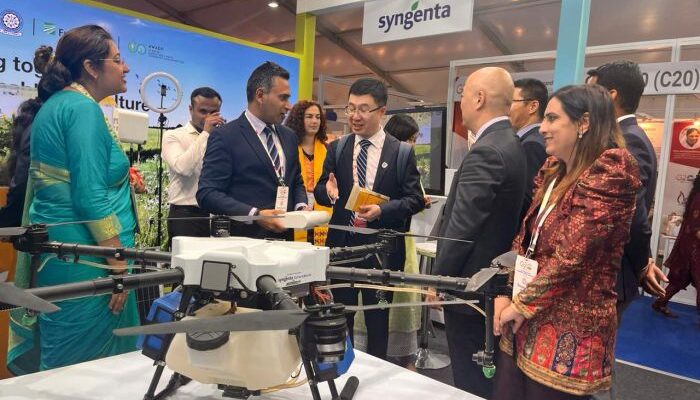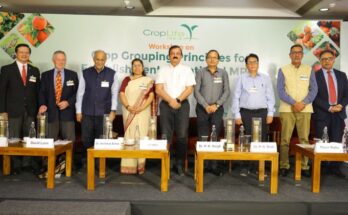Amritsar: Syngenta, in partnership with the Indian Institute of Technology, Ropar (IIT Ropar), is displaying its biodiversity sensor project at the G20 Education Working Group meeting in Amritsar, Punjab today. It is also showcasing the deployment of drones for use in spraying crop protection solutions and how it is empowering farmers by helping them save money, labour cost and time to enhance their income eventually. Chief Minister of Punjab, Bhagwant Singh Mann witnessed Syngenta’s farmer-centric tech solutions and complimented the Biodiversity Sensor initiative which is key to understand and monitor biodiversity in Punjab farms. Biodiversity Sensor Project is Syngenta, IIT Ropar and Fraunhofer joint initiative.
The low-cost, solar-powered Biodiversity Sensor features continuous biodiversity monitoring that automatically, autonomously, and reliably identifies most insect species. This data will give researchers, policymakers and farmers the information they need to help biodiversity thrive.
The first Biodiversity Sensor prototype was launched last year. Through 2023, Syngenta will develop more prototypes and continue refining the sensor’s artificial intelligence and machine learning algorithms.
You may also like to read: Garuda Aerospace, Ninjacart partner to make agricultural drones easily accessible to farmers
“Our tech-led collaborations with experts and creation of a farmer-centric ecosystem are key to address challenges faced by farmers to feed a growing population,” said, Susheel Kumar, MD & Country Head, Syngenta India. He added that “One of our primary goals is to identify, develop and scale a series of innovative, breakthrough transformations that will enable farmers to increase their yields sustainably. Individuals and institutions must work collectively to utilise technology and conserve our rich biodiversity,” Susheel added.
Over time, biodiversity sensors around the world will gather a continuous stream of open and usable data. “By collecting and analysing this information across geographies, we can create a common language for fact-based discussions among various stakeholders and enable organisations to develop game-changing innovations,” said, Pushpendra P Singh, Associate Professor, Department of Physics, IIT Ropar.
At the meeting, Syngenta also highlighted its drone programme. Syngenta was the first private company to get approval from the Central Insecticides Board, Government of India to use drones for spraying its product Amistar on paddy to protect the crops against fungal infections, Blast & Sheath Blight. “Encouraged by this along with the policy push by Government of India and the state government, Syngenta organised a unique, first-of-its-kind Drone Yatra, under which a drone awareness van moved across 17,000 km in 13 states reaching out to 15,000 farmers and giving them demos on drone spraying,” informed Susheel.
You may also like to read: CropLife India conducts workshop on ‘Innovative Technologies in Crop Protection’ in Telangana
Committed to regenerative agriculture, blending sustainable innovation with tradition – focus on regeneration of soil and the planet’s ecosystem, Syngenta helps produce high productivity and high-quality food and helps fight climate change and restore lost biodiversity. The greater use of technologies, adoption of best practices and Good Growth Plan – an ambitious initiative of Syngenta that focuses on the urgent fight against climate change and biodiversity loss for regenerative and sustainable agriculture.
Syngenta works closely with Syngenta Foundation India (SFI) in training Agri-Entrepreneurs (AEs), who provide multiple agri and allied services to farmers. Under this programme, village youth are identified, trained and certified by National Institute of Agriculture Marketing (NIAM) and mentored to build businesses that increase smallholder farmer (SHF) incomes, efficiency and reduce climate footprint through better and cheaper inputs, access to markets, credit, and insurance. The overall objective of this programme is to develop and anchor self-sustainable AEs to provide agriculture services to smallholder farmers to fulfil the threefold purpose of generating rural employment, improving agricultural incomes and practices and furthering environmental sustainability. 10,911 AEs have been trained so far across India.
The Group of Twenty (G20) is the premier forum for international economic cooperation. It plays an important role in shaping and strengthening global architecture and governance on major international economic issues. India holds the G20 Presidency until November 30, 2023, and has been hosting related events around the country.




